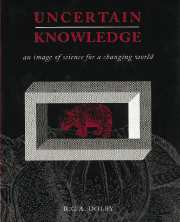Book contents
- Frontmatter
- Contents
- Preface
- 1 Introduction
- Part I The nature of science
- 2 Levels of cognitive activity
- 3 Facts in frameworks
- 4 Rationality, irrationality, and relativism
- 5 Knowledge and reality
- 6 A new account of the scientific process
- Part II Does science have distinctive qualities?
- Part III Changing science in a changing world?
- Appendix: Summary of cases of marginal and disputed science
- References
- Index
4 - Rationality, irrationality, and relativism
Published online by Cambridge University Press: 28 January 2010
- Frontmatter
- Contents
- Preface
- 1 Introduction
- Part I The nature of science
- 2 Levels of cognitive activity
- 3 Facts in frameworks
- 4 Rationality, irrationality, and relativism
- 5 Knowledge and reality
- 6 A new account of the scientific process
- Part II Does science have distinctive qualities?
- Part III Changing science in a changing world?
- Appendix: Summary of cases of marginal and disputed science
- References
- Index
Summary
Rationality
One of the intellectual skills we have inherited from the ancient Greeks is a way of formalising arguments by laying down explicit rules which ensure that a conclusion reached from true premises is also true. These rules of valid reasoning were elaborated by the ancient Greeks into deductive systems such as Aristotelian syllogistic logic and Euclidean geometry.
The success of this tradition made explicit formalised deductive reasoning into a model for all reasoning. It made argument the primary form of rationality and explicit argument according to universally agreed rules became a skill inculcated by education and applied widely in systematised learning. Our ideals of knowledge came to be shaped around this model of rationality. We should strive to formulate our ideas in statements, beginning with assertions about which there is minimal room for doubt, building on this firm foundation with valid reasoning that preserves truth at every step. Because such reasoning is explicit, it can be publicly scrutinised. Because it is valid, it does not depend on who produced it or where it is produced, but holds for anyone who is prepared to accept the premises.
Aristotelian syllogistic logic (which renders reasoning as triads of statements, in which the conclusion follows from two premises, according to a limited set of rules, e.g. ‘All men are mortal’ / ‘Socrates is a man’ / Therefore ‘Socrates is mortal’) was the main model of deductive reasoning for more than two millennia. However, it was increasingly clear that it was too limited for the grand aims described.
- Type
- Chapter
- Information
- Uncertain KnowledgeAn Image of Science for a Changing World, pp. 55 - 99Publisher: Cambridge University PressPrint publication year: 1996



